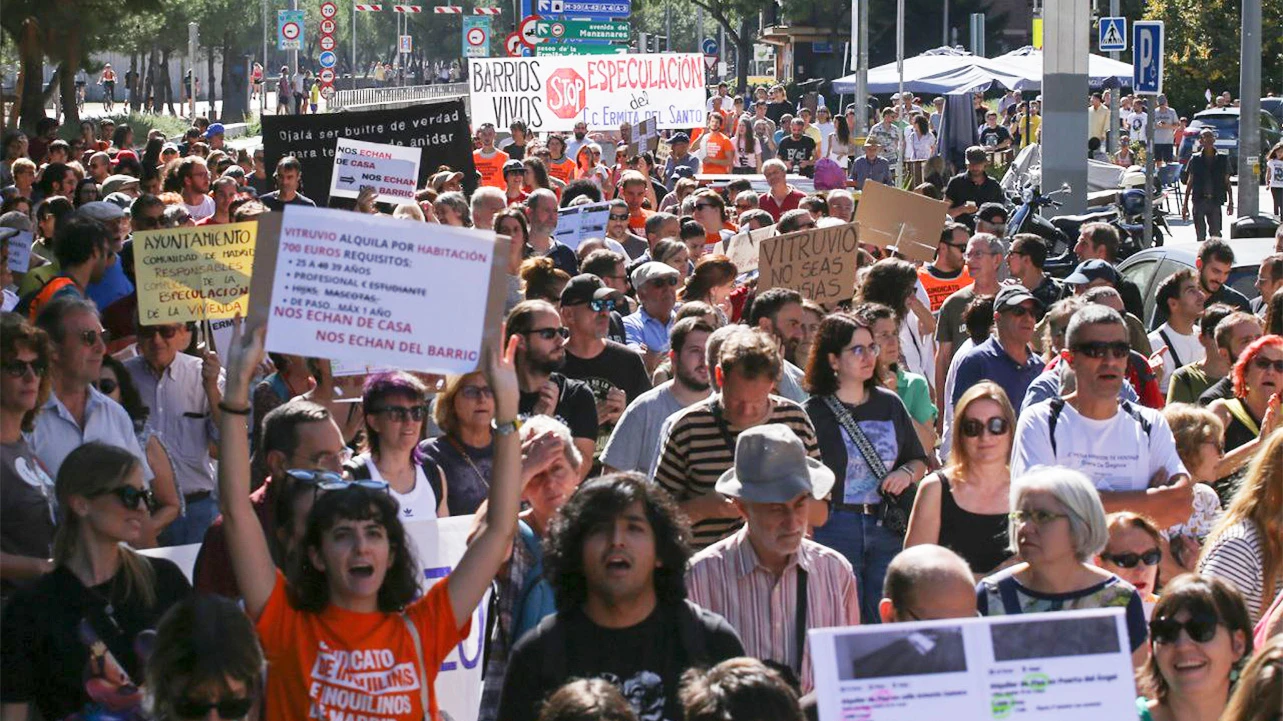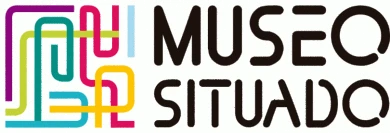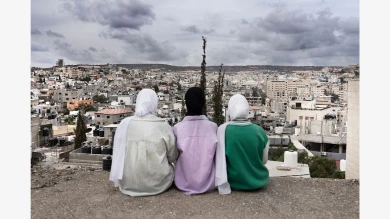
Held on 16 Nov 2023
This thirtieth edition of Situated Voices addresses the housing problem via the neighbourhood collectives GRIGRI and Lavapiés, ¿dónde vas?, along with Museo Situado. With its gaze fixed on the nearby Lavapiés neighbourhood and in connection with other areas and territories, a conversation is set out from a place of urgency and around collective alternatives to the current predatory and individualistic real estate model.
In recent years, issues such as the lack of social housing, rising rent prices, the mass proliferation of holiday apartments, accelerated gentrification and rampant real estate speculation have triggered an unprecedented housing crisis. In Spain, the cycle stretches back to 1998 with the approval of the so-called “Land Use Law”, which caused the housing bubble to burst in 2008 and thus compromised the Spanish mortgage system, the effects of which still reverberate today. The first citizen initiatives that emerged, such as PAH (The Platform for People Affected by Mortgages), helped to keep many people afloat and was defined by collective strategies to halt evictions and by sparking public debate around the constitutional right to access decent housing.
Today’s imposed model is rent seeking. From 2017 to the present, new tenants’ unions and neighbourhood organisations have emerged around state territory, looking to strengthen collective power. May 2023 saw the approval of the new Law 12/2023 for the right to housing, and with the aim of regulating basic conditions that guarantee access to decent and adequate housing under affordable conditions. Yet, what are the real changes that protect the right to access decent housing? How is the legislation going to impact people’s material and living conditions? What mechanisms does the market have to avoid state regulation? How can residents organise in neighbourhoods and cities to slow down speculative trends?
This activity also offers a children’s play centre, organised by the collective Esta es una plaza, to help with childcare. A registration form for the activity is available at this link
Organised by
Programme
Organised by

Organised by

Participants
Carme Arcarazo is a housing activist with Sindicat de Llogateres i Llogaters and a researcher at the Barcelona Institute of Urban Research (IDRA). She studied Economy and Political Science at the University of Amsterdam, and has specialised in the study of cities, both in Mexico (Urban Management, UNAM) and in Barcelona (MA in Urban Studies, UAB). Moreover, she has worked in urban laboratories in Mexico City and Sant Boi, and has been an international observer, supporting people defending land and territories under threat in southern Mexico. internacional, acompañando a personas defensoras de la tierra y el territorio amenazadas en el sur de México.
José Daniel López García is a member of the cooperative Entrepatios and a resident of Las Carolinas, the first collaborative housing building in the city of Madrid. Entrepatios is an intergenerational, eco-social, right-of-use housing cooperative which aims to put into practice other forms of city living which do not allow for real estate speculation and which consider environmental sustainability and the creation of community.
Mar M. Núñez is an artist and designer, as well as a member of the Museo Situado assembly, and a Lavapiés resident. As an artist, her concerns and practice focus on public art, which she works on through her citizen activity. Since 1998, she has participated in social movements with the aim of critically intervening in the construction of city and culture. At present, she is part of the Lavapiés, ¿dónde vas? collective, which addresses the gentrification and touristification of the Lavapiés neighbourhood.
Víctor Manuel Palomo is an activist and spokesperson for the Sindicato de Inquilinas e Inquilinos de Madrid (the Union of Madrid Tenants) and specialises in issues related to rentals and foreclosures from a right-to-housing perspective. He also works to defend residents’ right to the city in specific areas where there is also human rights violations, such as Cañada Real Galiana. Galiana.
Más actividades

Institutional Decentralisation
Thursday, 21 May 2026 – 5:30pm
This series is organised by equipoMotor, a group of teenagers, young people and older people who have participated in the Museo Reina Sofía’s previous community education projects, and is structured around four themed blocks that pivot on the monstrous.
This fourth and final session centres on films that take the museum away from its axis and make it gaze from the edges. Pieces that work with that which is normally left out: peripheral territories, unpolished aesthetics, clumsy gestures full of intent. Instead of possessing an institutional lustre, here they are rough, precarious and strange in appearance, legitimate forms of making and showing culture. The idea is to think about what happens when central authority is displaced, when the ugly and the uncomfortable are not hidden, when they are recognised as part of the commons. Film that does not seek to be to one’s liking, but to open space and allow other ways of seeing and inhabiting the museum to enter stage.
![Tracey Rose, The Black Sun Black Star and Moon [La luna estrella negro y negro sol], 2014.](https://recursos.museoreinasofia.es/styles/small_landscape/public/Obra/AD07091_2.jpg.webp)
On Black Study: Towards a Black Poethics of Contamination
Monday 27, Tuesday 28 and Wednesday 29 of April, 2026 – 16:00 h
The seminar On Black Study: Towards a Black Poethics of Contamination proposes Black Study as a critical and methodological practice that has emerged in and against racial capitalism, colonial modernity and institutional capture. Framed through what the invited researcher and practitioner Ishy Pryce-Parchment terms a Black poethics of contamination, the seminar considers what it might mean to think Blackness (and therefore Black Study) as contagious, diffuse and spreadable matter. To do so, it enacts a constellation of diasporic methodologies and black aesthetic practices that harbor “contamination” -ideas that travel through texts, geographies, bodies and histories- as a method and as a condition.
If Blackness enters Western modernity from the position of the Middle Passage and its afterlives, it also names a condition from which alternative modes of being, knowing and relating are continually forged. From within this errant boundarylessness, Black creative-intellectual practice unfolds as what might be called a history of touches: transmissions, residues and socialities that unsettle the fantasy of pure or self-contained knowledge.
Situated within Black radical aesthetics, Black feminist theory and diasporic poetics, the seminar traces a genealogy of Black Study not as an object of analysis but as methodological propositions that continue to shape contemporary aesthetic and political life. Against mastery as the horizon of study, the group shifts attention from what we know to how we know. It foregrounds creative Black methodological practices—fahima ife’s anindex (via Fred Moten), Katherine McKittrick’s expansive use of the footnote, citation as relational and loving labour, the aesthetics of Black miscellanea, and Christina Sharpe’s practices of annotation—as procedures that disorganise dominant regimes of knowledge. In this sense, Black Study is approached not as a discrete academic field but as a feel for knowing and knowledge: a constellation of insurgent practices—reading, gathering, listening, annotating, refusing, world-making—that operate both within and beyond the university.
The study sessions propose to experiment with form in order to embrace how ‘black people have always used interdisciplinary methodologies to explain, explore, and story the world.’ Through engagements with thinkers and practitioners such as Katherine McKittrick, C.L.R. James, Sylvia Wynter, Christina Sharpe, Fred Moten, Tina Campt, Hilton Als, John Akomfrah, fahima ife and Dionne Brand, we ask: What might it mean to study together, incompletely and without recourse to individuation? How might aesthetic practice function as a poethical intervention in the ongoing work of what Sylvia Wynter calls the practice of doing humanness?

Intergenerationality
Thursday, 9 April 2026 – 5:30pm
This series is organised by equipoMotor, a group of teenagers, young people and older people who have participated in the Museo Reina Sofía’s previous community education projects, and is structured around four themed blocks that pivot on the monstrous.
The third session gazes at film as a place from which to dismantle the idea of one sole history and one sole time. From a decolonial and queer perspective, it explores films which break the straight line of past-present-future, which mix memories, slow progress and leave space for rhythms which customarily make no room for official accounts. Here the images open cracks through which bodies, voices and affects appear, disrupting archive and questioning who narrates, and from where and for whom. The proposal is at once simple and ambitious: use film to imagine other modes of remembering, belonging and projecting futures we have not yet been able to live.

Remedios Zafra
Thursday March 19, 2026 - 19:00 h
The José Luis Brea Chair, dedicated to reflecting on the image and the epistemology of visuality in contemporary culture, opens its program with an inaugural lecture by essayist and thinker Remedios Zafra.
“That the contemporary antifeminist upsurge is constructed as an anti-intellectual drive is no coincidence; the two feed into one another. To advance a reactionary discourse that defends inequality, it is necessary to challenge gender studies and gender-equality policies, but also to devalue the very foundations of knowledge in which these have been most intensely developed over recent decades—while also undermining their institutional support: universities, art and research centers, and academic culture.
Feminism has been deeply linked to the affirmation of the most committed humanist thought. Periods of enlightenment and moments of transition toward more just social forms—sustained by education—have been when feminist demands have emerged most strongly. Awareness and achievements in equality increase when education plays a leading social role; thus, devaluing intellectual work also contributes to harming feminism, and vice versa, insofar as the bond between knowledge and feminism is not only conceptual and historical, but also intimate and political.
Today, antifeminism is used globally as the symbolic adhesive of far-right movements, in parallel with the devaluation of forms of knowledge emerging from the university and from science—mistreated by hoaxes and disinformation on social networks and through the spectacularization of life mediated by screens. These are consequences bound up with the primacy of a scopic value that for some time has been denigrating thought and positioning what is most seen as what is most valuable within the normalized mediation of technology. This inertia coexists with techno-libertarian proclamations that reactivate a patriarchy that uses the resentment of many men as a seductive and cohesive force to preserve and inflame privileges in the new world as techno-scenario.
This lecture will address this epochal context, delving into the synchronicity of these upsurges through an additional parallel between forms of patriarchal domination and techno-labor domination. A parallel in which feminism and intellectual work are both being harmed, while also sending signals that in both lie emancipatory responses to today’s reactionary turns and the neutralization of critique. This consonance would also speak to how the perverse patriarchal basis that turns women into sustainers of their own subordination finds its equivalent in the encouraged self-exploitation of cultural workers; in the legitimation of affective capital and symbolic capital as sufficient forms of payment; in the blurring of boundaries between life and work and in domestic isolation; or in the pressure to please and comply as an extended patriarchal form—today linked to the feigned enthusiasm of precarious workers, but also to technological adulation. In response to possible resistance and intellectual action, patriarchy has associated feminists with a future foretold as unhappy for them, equating “thought and consciousness” with unhappiness—where these have in fact been (and continue to be) levers of autonomy and emancipation.”
— Remedios Zafra

27th Contemporary Art Conservation Conference
Wednesday, 4, and Thursday, 5 March 2026
The 27th Contemporary Art Conservation Conference, organised by the Museo Reina Sofía’s Department of Conservation and Restoration, with the sponsorship of the Mapfre Foundation, is held on 4 and 5 March 2026. This international encounter sets out to share and debate experience and research, open new channels of study and reflect on conservation and the professional practice of restorers.
This edition will be held with in-person and online attendance formats, occurring simultaneously, via twenty-minute interventions followed by a five-minute Q&A.
